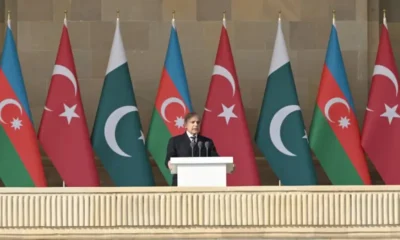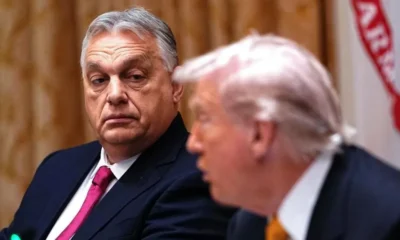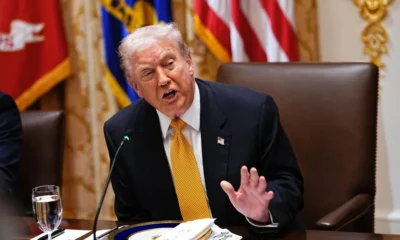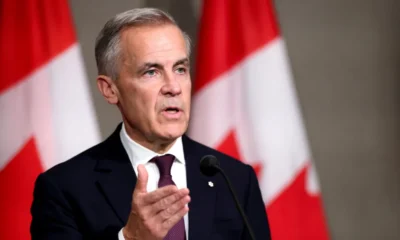American News
Los Angeles in Flames

Paris (Imran Y. CHOUDHRY) :- Former Press Secretary to the President, Former Press Minister to the Embassy of Pakistan to France, Former MD, SRBC Mr. Qamar Bashir analysis : Los Angeles, one of the most ethnically diverse cities in the United States, has become the flashpoint of a deepening constitutional and humanitarian crisis. What began as a federal crackdown on undocumented immigrants has now snowballed into mass protests, legal confrontations, and a dangerous standoff between federal authority and state governance. President Donald Trump’s fulfillment of his campaign promise to deport “millions and millions” of undocumented immigrants has triggered a sequence of events that many fear could push the republic to the brink.
The deployment of 4,100 National Guard troops and 700 Marines to enforce Immigration and Customs Enforcement (ICE) raids in Los Angeles was ordered by the president under the Insurrection Act of 1807—an act traditionally invoked to suppress rebellion. However, this action was taken without the consent of California’s governor, in direct contradiction of the 10th Amendment which preserves the sovereignty of states. Governor Gavin Newsom, Los Angeles Mayor Karen Bass, and Attorney General Rob Bonta all denounced the deployment, with legal actions initiated to block federal troops from operating on state soil. They warned that this unprecedented federal intrusion amounted to a political stunt that undermines state rights and weaponizes the military against civilians.
During a contentious congressional hearing, Secretary of Defense Pete Hegseth defended the deployment but stumbled when asked to cite the exact legal basis for bypassing state authority. His testimony, marked by ambiguity and circular justifications, drew sharp criticism from lawmakers who viewed it as an alarming admission of executive overreach. Meanwhile, President Trump, addressing a rally, escalated the rhetoric further by declaring that anyone who burns the American flag will face one year in prison—despite the Supreme Court’s ruling in Texas v. Johnson (1989) that flag desecration is protected under the First Amendment as symbolic political speech. This raised serious questions about how far the administration is willing to stretch constitutional limits to enforce its immigration agenda and silence dissent.
In the streets of Los Angeles, mass protests erupted. While the majority of demonstrations remained peaceful, isolated incidents of vandalism, arson, and clashes with law enforcement did occur. Protesters burned flags to express defiance, while authorities responded with rubber bullets and mass arrests. But unlike the 1992 Rodney King riots, this unrest was limited in scale and geography—mostly confined to a few downtown blocks—yet symbolically far more consequential. It revealed a nation increasingly divided on not just immigration, but governance itself.
Amid these developments, ICE operations came under further scrutiny when it was revealed that many of the agents conducting raids were not government employees but private contractors, incentivized by a pay-per-arrest model. Disturbing reports emerged of masked individuals in unmarked vehicles attempting to detain children from elementary schools, falsely claiming parental consent. Fortunately, school officials resisted, preventing what could have been a tragic episode. This bounty-style enforcement has drawn outrage from legal experts and human rights groups, who see it as a dangerous erosion of accountability and due process.
Los Angeles, with nearly 1 million undocumented immigrants, represents the very mosaic of modern America. Its residents are nearly 49% Hispanic, 23% non-Hispanic White, 11% Asian, and 9% Black. Many undocumented immigrants have lived here for years, pay taxes, and raise American-born children. Yet the aggressive, indiscriminate nature of ICE’s operations has swept up individuals based not on criminal records but on appearance, language, and origin. The result has been broken families, frightened communities, and a growing perception that this crackdown is more about optics than justice.
Several political leaders have added their voices to the chorus. While Governor Newsom and Mayor Bass described the military presence as unlawful and provocative, other national figures offered mixed responses. Senator Bernie Sanders warned of a dangerous descent into authoritarianism, while Senator Tom Cotton supported the move, urging a stronger show of federal force. Mexican President Claudia Sheinbaum demanded due process for Mexican nationals caught in the raids, insisting that most are law-abiding individuals, not criminals. These statements, although divergent, reflect the magnitude of concern shared by both domestic and international observers about the consequences of using military power to enforce immigration policy.
Equally telling is the sentiment of the general public, widely shared across social media platforms such as X (formerly Twitter). Supporters of Trump’s actions argue that law and order must be preserved at all costs and accuse liberal cities of protecting criminals. Some even cheered the arrests and called for more aggressive crackdowns. Others, however, viewed the deployment of Marines and National Guard to detain immigrants as draconian and unconstitutional. Many feared that militarized immigration enforcement would soon be used as a broader political tool to intimidate opposition and suppress dissent. A recurring theme among dissenters was the belief that this kind of power grab represents not patriotism, but creeping authoritarianism. One viral comment read: “This is not law enforcement. This is political theater with tanks.”
While America has seen deportations under prior administrations, never has the strategy been so kinetic, so public, and so constitutionally ambiguous. The present approach tramples on due process and bypasses civilian courts, replacing legal mechanisms with brute force. If undocumented immigrants accused of crimes are to be deported, that must happen through established legal procedures—evidence, hearings, and rulings—not through masked arrests and military interventions. Otherwise, the very concept of justice is hollowed out.
What’s at stake now is far more than immigration enforcement. It’s about the rule of law, the balance of power, and the soul of the American republic. If the federal government continues to override states, silence dissent, and criminalize protest, the nation risks transforming its democracy into a centralized regime driven by executive fiat. There is an urgent need to pause, reflect, and correct course. Deportation of violent criminals may be justifiable, but it must be conducted through lawful and ethical means—not under the shadow of tanks and in violation of the Constitution.
Let us be clear: restoring order does not require rejecting justice. Protecting borders must not mean abandoning freedoms. If America is to remain a beacon of democracy, then it must choose sanity over spectacle, principle over power, and law over lawlessness.
Peace be upon America, and peace be upon its people. May we remain governed by the Constitution—not by campaign promises written in anger and enforced through fear.
American News
What Hungary’s Orban did – and didn’t – get from Trump

On the surface, the Hungarian prime minister’s trip was exactly what he went to Washington for: luxuriant praise and an exemption from sanctions on Russian oil, gas and nuclear supplies.
And all that just five months out from a difficult election.
Look closer, however, and the picture is less clear cut. The US side struck a hard trade deal – and an expensive one for Hungary.
And there’s no progress on Viktor Orban’s biggest headache: ending the war in neighbouring Ukraine, and with it the long shadow the conflict casts over Hungary.
Let’s look first at Orban’s key win – an exemption from US sanctions, which a White House official told the BBC was time-limited to one year, although Péter Szijjártó, Hungary’s foreign minister, said would be indefinite.
The time span is interesting. Trump clearly wants to help his friend win the election in April. And the exemption even partially dovetails with the European Commission demand to all member states to end the import of Russian oil, gas and nuclear fuel by the end of 2027.
What is missing, from an EU perspective, is any political commitment from Orban to meet that demand – a commitment made and fulfilled by the Czech government. And the EU is trying to tighten energy sanctions – to the fury of Hungary and Slovakia.
Away from the media spotlight, the Hungarian energy company MOL has been upgrading two of its refineries – Százhalombatta in Hungary and the Slovnaft facility in Bratislava – to process Brent crude instead of the high-sulphur Urals crude which flows through Russian pipelines.
On Friday, MOL said 80% of its oil needs could be imported through the Adria pipeline from Croatia, albeit with higher logistical costs and technical risks.
So Orban’s argument, which so impressed Trump, that Hungary, as a landlocked country, has no alternative to Russian oil may not strictly be true.
Overall, Hungary and Slovakia have together paid Russia $13bn (£10bn) for its oil between its full-scale invasion of Ukraine in February 2022 and the end of 2024.
The one-year window granted by the US is nevertheless a valuable respite for Hungarian households this winter.
Orban told pro-government reporters who travelled with him to Washington that otherwise utility bills “could have gone up by up to three times in December”. Capping those bills by various means has been a central plank of his popularity in Hungary since 2013.
Under the US exemption, Hungary can also continue to buy Russian gas through the Turkstream pipeline, which traverses the Balkans, and pay for it in hard currency ($185m in August alone) using a Bulgarian loophole. Orban has agreed to buy LNG from the US worth $600 million, according to Bloomberg.
Another key part of the Washington deal is nuclear.
Hungary agreed to buy US nuclear fuel rods for its Paks 1 nuclear power station (at a cost of $114m), in parallel to those bought from Russia’s Rosatom and France’s Framatome.
Russian plans to finance and build the nuclear extension, called Paks 2, have been long delayed by technical and licensing issues. The US agreement to lift all nuclear sanctions on Hungary may help restart that project, but thorny problems remain.
Hungary has also agreed to buy US technology to extend the short-term storage of spent nuclear fuel at Paks for between $100m and $200m.
American News
US to boycott G20 in South Africa, Trump says

Donald Trump has said the US will not attend the G20 summit in South Africa over widely discredited claims that white people are being persecuted in the country.
The US president said it was a “total disgrace” that South Africa is hosting the meeting, where leaders from the world’s largest economies will gather in Johannesburg later this month.
South Africa’s foreign ministry described the decision by the White House as “regrettable”.
None of South Africa’s political parties – including those that represent Afrikaners and the white community in general – have claimed that there is a genocide in South Africa.
Trump posted on his social media platform Truth Social: “It is a total disgrace that the G20 will be held in South Africa.
“Afrikaners (people who are descended from Dutch settlers, and also French and German immigrants) are being killed and slaughtered, and their land and farms are being illegally confiscated,” he wrote.
“No US government official will attend as long as these human rights abuses continue.”
Trump had earlier said South Africa should not be in the G20 at all, and that he would send vice-president JD Vance, instead of attending himself.
But now the White House says no US official will go.
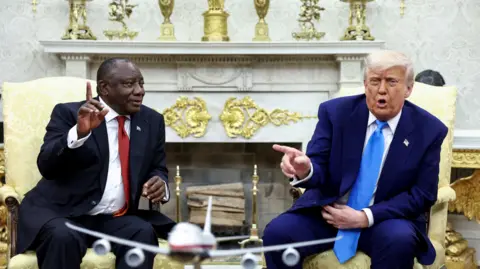
Every year, a different member state hosts the G20 and sets the agenda for the summit – with the US due to take its turn after South Africa.
The South African foreign ministry said in a statement: “The South African government wishes to state, for the record, that the characterisation of Afrikaners as an exclusively white group is ahistorical.
“Furthermore, the claim that this community faces persecution, is not substantiated by fact.”
Since returning to office in January, Trump has repeatedly accused South Africa of discriminating against its white minority, including in May when when he confronted his South African counterpart Cyril Ramaphosa in the Oval Office.
The Trump administration has given Afrikaners refugee status, stating a “genocide” is taking place in South Africa. Last week, the White House announced plans to cap refugee admissions at a record low, and give priority to white South Africans.
South Africa’s government said the claims of a white genocide is “widely discredited and unsupported by reliable evidence” and pointed to the “limited uptake” of this offer by South Africans.
The claims were dismissed as “clearly imagined” by a South African court in February.
The G20 was founded in 1999 after the Asian financial crisis. The nations involved have more than 85% of the world’s wealth and its aim was to restore economic stability.
The first leaders’ summit was held in 2008 in response to that year’s global financial turmoil, to promote international co-operation.
Now the leaders get together each year – along with representatives of the European Union and African Union – to talk about the world’s economies and the issues countries are facing.
American News
Conservative justices sharply question Trump tariffs in high stakes hearing

Donald Trump’s sweeping use of tariffs in the first nine months of his second term was sharply questioned during oral arguments before the Supreme Court on Wednesday.
Chief Justice John Roberts, and justices Amy Coney Barrett and Neil Gorsuch – three conservative jurists considered swing votes in this case – peppered US Solicitor General John Sauer, representing the president’s administration before the court.
They were joined by the court’s three liberal justices, who also expressed scepticism about whether federal law – and the US Constitution – give the president authority to unilaterally set tariff levels on foreign imports.
“The justification is being used for power to impose tariffs on any product from any country in any amount, for any length of time,” Roberts said.
If the court ruled for Trump in this case, Gorsuch wondered: “What would prohibit Congress from just abdicating all responsibility to regulate foreign commerce?”
He added that he was “struggling” to find a reason to buy Sauer’s arguments.
In a possible sign of case’s complexities, the hearing stretched almost three hours – far longer than the time formally allotted.
Arguing over ‘country-killing’ crises
The case centres around a 1977 law, the International Emergency Economic Powers Act (IEEPA), that Trump’s lawyers have said gives the president the power to impose tariffs. Although the Constitution specifically vests Congress with tariff authority, Trump has claimed that the legislature delegated “emergency” authority to him to bypass longer, established processes.
Sauer asserted that the nation faced unique crises – ones that were “country-killing and not sustainable” – that necessitated emergency action by the president. He warned that if Trump’s tariff powers were ruled illegal, it would expose the US to “ruthless trade retaliation” and lead to “ruinous economic and national security consequences”.
Trump first invoked IEEPA in February to tax goods from China, Mexico and Canada, saying drug trafficking from those countries constituted an emergency.
He deployed it again in April, ordering levies from 10% to 50% on goods from almost every country in the world. This time, he said the US trade deficit – where the US imports more than it exports – posed an “extraordinary and unusual threat”.
Those tariffs took hold in fits and starts this summer while the US pushed countries to strike “deals”.
Lawyers for the challenging states and private groups have contended that while the IEEPA gave the president power to regulate trade, it made no mention of the word “tariffs”.
Neil Katyal, making the case for the private businesses, said it was “implausible” that Congress “handed the president the power to overhaul the entire tariff system and the American economy in the process, allowing him to set and reset tariffs on any and every product from any and every country, at any and all times”.
He also challenged whether the issues cited by the White House, especially the trade deficit, represent the kind of emergencies the law envisioned.
Suppose America faced the threat of war from a “very powerful enemy”, Samuel Alito, another conservative justice, asked. “Could a president under this provision impose a tariff to stave off war?”
Katyal said that a president could impose an embargo or a quota, but a revenue-raising tariff was a step too far.
For Sauer, this was a false choice. Presidents, he said, have broad powers over national security and foreign policy – powers that the challengers want to infringe on.
Tariffs v taxes
A key question could be whether the court determines whether Trump’s tariffs are a tax.
Several justices pointed out that the power to tax – to raise revenue – is explicitly given to Congress in the Constitution.
Sauer’s reply was that Trump’s tariffs are a means of regulating trade and that any revenue generated is “only incidental”.
Of course, Trump himself has boasted about the billions his tariffs have generated so far and how essential this new stream of funding is to the federal government.
The justices spent very little time on questions about refunds or whether the president’s emergency declarations were warranted. Instead they spent most of their time examining the text of IEEPA and its history.
Sauer urged them to understand tariffs as a natural extension of other powers granted to the president under the law rather than a tax. “I can’t say it enough – it is a regulatory tariff, not a tax,” he said.
But that appeared to be a stumbling block for many of the justices.
“You want to say that tariffs are not taxes but that’s exactly what they are,” Justice Sotomayor said.
Many seemed persuaded by arguments from the business and states that tariffs, as a tax paid by US businesses, were fundamentally different from the other kinds of powers addressed by the law.
But not all.
Justice Kavanaugh expressed doubts on that point toward the end of the hearing, saying it didn’t seem to very “common sense” to give the president the power to block trade entirely, but not impose a 1% tariff, sugggesting it left a gap like a donut hole.
“It’s not a donut hole. It’s a different kind of pastry,” Gutman responded, drawing chuckles in the crowd.
What the court’s ruling could do
Treasury Secretary Scott Bessent, who attended the hearing, made no comment when asked by the BBC what he thought of the hearing. Secretary of Commerce Howard Lutnick, also in court, flashed a thumbs-up.
US Trade Envoy Jamieson Greer was in court, along with Minnesota Senator Amy Klobuchar, who said outside after arguments that she was “hopeful” based on the questions asked that the court would overturn the tariffs.
“I thought they were very good questions,” she said, describing tariffs as an “unconstitutional power grab” by the president.
The hearing drew a full audience, with press pushed into overflow seats behind columns.
If a majority of the Supreme Court rules in Trump’s favour, it will overturn the findings of three lower courts that already ruled against the administration.
The decision, no matter how it works out, has implications for an estimated $90bn worth of import taxes already paid – roughly half the tariff revenue the US collected this year through September, according to Wells Fargo analysts.
Trump officials have warned that sum could swell to $1tn if the court takes until June to rule.
During oral arguments, Barrett grappled with the question of reimbursing such revenue, wondering if it would be a “complete mess”.
Katyal responded by saying that small businesses might get refunds, but bigger companies would have to follow “administrative procedures”. He admitted that it was a “very complicated thing”.
In remarks on Wednesday, press secretary Karoline Leavett hinted that the administration already is looking at other ways to impose tariffs if the Supreme Court rules against them.
“The White House is always preparing for Plan B,” she said. “It would be imprudent of the president’s advisors not to prepare for such a situation.”
-

 Europe News8 months ago
Europe News8 months agoChaos and unproven theories surround Tates’ release from Romania
-

 American News8 months ago
American News8 months agoTrump Expels Zelensky from the White House
-

 American News8 months ago
American News8 months agoTrump expands exemptions from Canada and Mexico tariffs
-

 American News8 months ago
American News8 months agoZelensky bruised but upbeat after diplomatic whirlwind
-

 Art & Culture8 months ago
Art & Culture8 months agoThe Indian film showing the bride’s ‘humiliation’ in arranged marriage
-

 Art & Culture8 months ago
Art & Culture8 months agoInternational Agriculture Exhibition held in Paris
-

 Politics8 months ago
Politics8 months agoUS cuts send South Africa’s HIV treatment ‘off a cliff’
-

 Politics8 months ago
Politics8 months agoWorst violence in Syria since Assad fall as dozens killed in clashes


